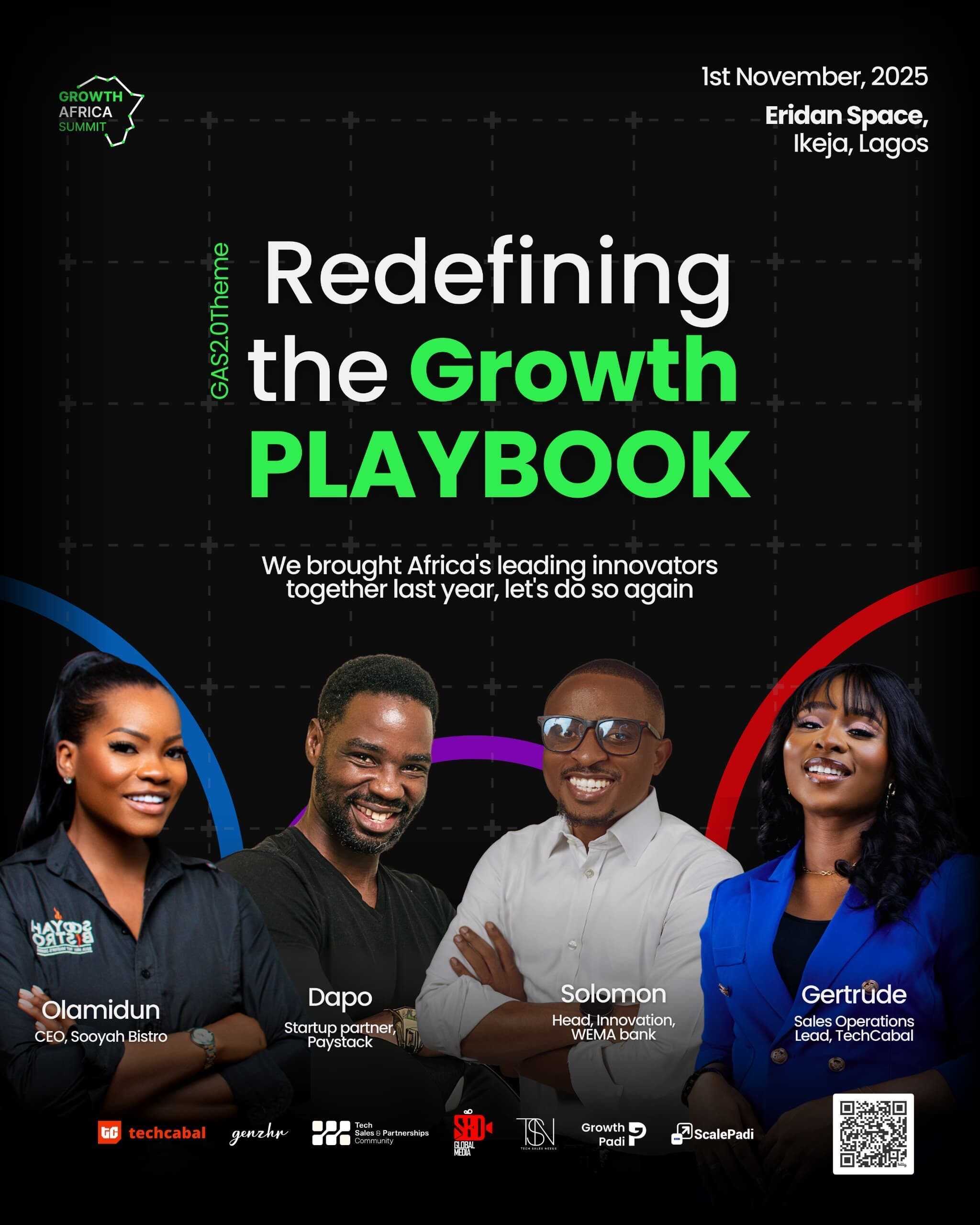Technology
👨🏿🚀TechCabal Daily – Taiwan unblocks South Africa
In partnership with Lire en Français اقرأ هذا باللغة العربية TGIF. Before you sign off for the weekend, weve got an insider gist for you: Moonshot flash sale is now active. Grab a 25% discount on all tickets to attend the most important tech event on October 1516, and get access to founders, inve...
TechCabal
published: Sep 26, 2025



TGIF. 
Before you sign off for the weekend, we’ve got an insider gist for you:  Moonshot flash sale is now active. Grab a 25% discount on all tickets to attend the most important tech event on October 15–16, and get access to founders, investors, regulators, and innovators at the forefront of Africa’s growing tech ecosystem. Offer valid for a limited time.
Moonshot flash sale is now active. Grab a 25% discount on all tickets to attend the most important tech event on October 15–16, and get access to founders, investors, regulators, and innovators at the forefront of Africa’s growing tech ecosystem. Offer valid for a limited time.
Speaking of the weekend, for the unlucky who live in Lagos, how have the floods been treating you? One thing I worry about during the yearly Lagos floods is how logistics providers cope. Do they brave the roads and charge extra, or do they just stay home? If you order food or have a delivery made to your house, tip your delivery person, especially if your street is waterlogged.
—Zia

Features
Quick Fire  with Solomon Kershima
with Solomon Kershima

Solomon Kershima is a Digital Innovation Leader, Mandela Washington Fellow (2025), and Founder of Skyhub Nigeria, a grassroots digital hub that has trained over 10,000 youths, supported more than 1,500 businesses, and incubated 12 startups through programmes in software development, digital marketing, and entrepreneurship.
Solomon also serves as Group Head of Startup Support, Innovative Solutions, and Digital Skills at the Benue Digital Infrastructure Company (BDIC), where he leads e-governance projects and statewide digital transformation initiatives.
- Explain your job to a 5-year-old.
I help people use computers and phones to learn new skills, start businesses, and solve problems. It’s like teaching someone how to use Lego blocks to build anything they can imagine.
- What inspired you to start Skyhub Nigeria?
I wanted young people, especially in Benue and across Nigeria, to have the same access to digital skills and opportunities as those in bigger cities and abroad. Skyhub started as a dream to show that even from Makurdi or Jos, we can create world-class tech talent and startups.
- How did your early experiences shape your approach to digital innovation and tech education?
In 2019, I was part of a team that trained over 2,000 young people across 20 northern states in just three months. That experience taught me the power of scale and community-driven learning. It shaped my belief that digital innovation is not just about tools, but about people, empowering them to create solutions that matter.
- If you could fix one thing about Africa’s tech ecosystem with a magic wand, what would it be?
Access. Too many young Africans have the talent and ideas but lack devices, internet, or mentorship. If I had a wand, I would make laptops, internet, and digital education accessible to every willing youth on the continent.
- What’s the biggest challenge when designing digital solutions for local contexts?
The biggest challenge is bridging the gap between global technology and local realities. Many solutions don’t fit because they ignore infrastructure gaps, culture, or affordability. Building for Africa means designing with empathy and simplicity.
- Can you share a story of a startup or youth whose journey at Skyhub left a lasting impact on you?
One of our incubated startups began as a young person with just curiosity and no laptop. With training and mentorship at Skyhub, he built a digital service platform now used by hundreds. We started to prove that talent exists everywhere; it just needs nurturing.
- How do you balance your work in government digital transformation with running a grassroots innovation hub?
It’s about synergy. At BDIC, I work on systemic digital infrastructure for the state, while at Skyhub, I stay close to the grassroots, training youths and startups. Both roles complement each other, ensuring innovation is driven from both top-down and bottom-up.
- What’s one thing you’re not an expert at but enjoy doing?
Music. I’m not a professional, but I enjoy listening to different sounds and sometimes playing around with beats. It helps me relax and sparks creativity.
eCommerce Without Borders: Get Paid Faster Worldwide

Whether you sell in Lagos or Nairobi, customers want local ways to pay. Let shoppers check out in their local currency, using cards, bank transfers, or mobile money. Set up seamless payments for your global online store with Fincra today.
Geopolitics
Taiwan pulls its punches in South Africa chip boycott

We bet you didn’t see this coming: In a surprising turn of events, Taiwan has walked back on its boycott of chip exports to South Africa.
Two days ago, Taiwan shocked markets by slapping export regulations on chips headed to South Africa. The restriction stipulated that Taiwan requires pre-approval for the bulk of chips sold to the nation. Officials say the move was part of negotiations with South Africa over moving its embassy from the nation’s capital city.
Now, Taiwan’s Economic Ministry says it’s suspending that decision after talks with its Foreign Ministry. This shows the nation’s unease over using its prized tech sector as a tool in political feuds.
Here’s the catch: This curb might have hurt Taiwan’s pockets. Reports show that South Africa imports a total of about $30 million of chips a year from Taiwan. The chips on the suspension list made up $4 million of Taiwan’s shipments to South Africa in 2024. Although it’s a fraction of what Taiwan exports to other countries, the hint that Taiwan might use chips as leverage was enough to rattle nerves in China and beyond.
The reversal is a balancing act. For now, South Africa gets its chips and Taiwan keeps its leverage, showing the world that if push comes to shove, it won’t hesitate to flex its tech muscle.
Paga is in USA

Big news! Paga Group is now live in the United States, with digital banking services designed for Africa’s diaspora! Eligible users can send, pay, and bank in US Dollars & Naira, safe, regulated, and borderless. Learn more
Layoffs
Ilara Health to lay off undisclosed number of staff

Look out! It’s raining job cuts in Kenya.
Ilara Health is the latest startup to swing the axe. The Kenya-based healthtech known for helping primary care clinics deliver better healthcare says it’s restructuring, and with that comes job cuts for an undisclosed number of employees. Those affected are now in the 30-day consultation window required by law.
So, what went wrong? Ilara blames market conditions and financing dynamics, which is code for money not coming when it was supposed to. That must sting because only nine months ago, the company got a $1 million loan from the US International Development Finance Corporation (DFC).
Nearly two weeks after this loan was approved, President Trump called for a pause in funding on nearly all US foreign assistance. This executive order was issued for the United States Agency for International Development (USAID), but it had effects on the DFC, the newest of the US foreign aid agencies.
Kenyan startups are good at giving the boot. Mobility startup, eBee, cut around 50 staff earlier in the year. In July, Mediamax also shed an undisclosed number of workers, its sixth round of job cuts in four years. That same month, Flutterwave slashed half of its team in Kenya and South Africa. Everyone is trimming. Kenya’s economy isn’t smiling at startups.
Ilara Health says it will now hold on to its core objectives and focus on services that bring the most money, proving that it can stay alive in a market that isn’t as patient as it used to be.
Turn your hustle into an online store with Paystack!

Anyone can sell online. With Paystack Storefront, you can create a sleek online store, share your link, and accept payments. No code needed. Get started here →
Regulation
Ghana wants digital lenders to pay $162,000 in licencing fees

The Bank of Ghana (BOG) has hit digital lenders with new rules requiring them to pay $162,000 in licencing fees, build physical offices, and cede 30% of their businesses to local ownership by November 1. The rule gives current operators two months to comply or shut down.
State of play: The BOG wants comprehensive business plans, risk management policies, anti-money laundering (AML) systems, and data protection mechanisms before anyone can lend a single cedi. It has also banned the industry’s notorious practices, meaning no more threatening borrowers, contacting their friends and family, or posting their names on social media for unpaid loans.
Why does this matter? The lightweight, algorithm-driven lending model that fintechs in the country like Izwe and PeaMoney relied on now faces issues. Now, these lenders must have local investors, physical offices, and $162,000 worth of capital reserves before they are permitted to operate in the space.
Between the lines: When big changes like this happen in the financial space, smaller, less significant players may be wiped out because they can’t meet the new requirements. Acquiring licences from the BOG could also offer some credibility that could help the digital lending space further develop by building partnerships with traditional banks.
Zoom out: African regulators are tired of the unchecked predatory lending practices and are now catching up to the digital lending space. Nigeria’s Federal Competition and Consumer Protection Commission (FCCPC), the country’s consumer protection watchdog, issued similar regulations in July with fines up to ₦100 million ($67,000) and five-year director bans for digital lenders with unfair interest rates and privacy violations.
Why do Nigerian graduates fail to find jobs? Find out in Nexford’s article

Millions graduate yearly in Nigeria, yet jobs remain scarce. Many lack the right skills, while those who have them struggle with poor pay or move abroad. What’s the real issue? Read more on Nexford.
CRYPTO TRACKER
The World Wide Web3
Source:

|
Coin Name |
Current Value |
Day |
Month |
|---|---|---|---|
| $109,450 |
– 2.11% |
– 1.83% |
|
| $3,955 |
– 1.40% |
– 14.44% |
|
| $2.76 |
– 2.79% |
– 8.21% |
|
| $196.19 |
– 3.99% |
– 3.60% |
* Data as of 06.10 AM WAT, September 26, 2025.
Read MoreStay in the loop
Never miss out on the latest insights, trends, and stories from Cedi Life! Be the first to know when we publish new articles by subscribing to our alerts.





 Secure 25% off your Moonshot ticket now.
Secure 25% off your Moonshot ticket now. 

